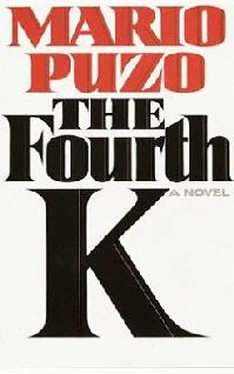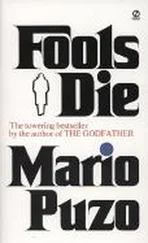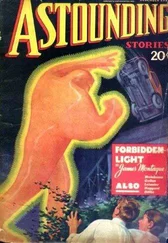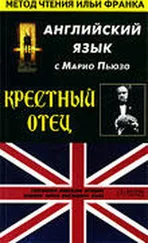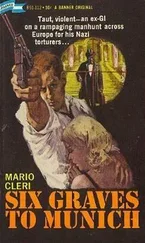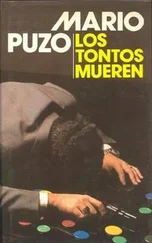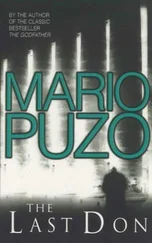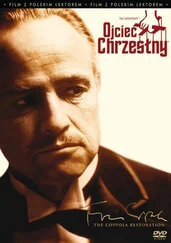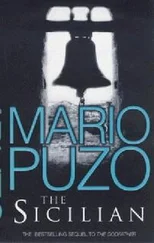Christian said casually, "Will Theresa be home for the holidays?"
Kennedy shrugged. "She's in Rome with a new boyfriend. She'll be flying in on Easter Sunday. As usual, she makes a point of ignoring religious holidays."
Christian said, "I'm glad she's getting the hell out. I really can't protect her in Europe. And she thinks she can shoot off her mouth there and it won't be reported here." He paused a moment. "If you do run again, you'll have to keep your daughter out of sight or disown her."
"I can't. If I do run again, I'll need the radical feminist vote."
Christian laughed. "OK," he said. "Now, about the birthday party for the Oracle. He is really looking forward to it."
"Don't worry," Kennedy said. "I'll give him the full treatment. My God, a hundred years old and he still looks forward to his birthday party."
"He was and is a great man," Christian said.
Kennedy gave him a sharp look. "You were always fonder of him than I ever was. He had his faults, he made his mistakes."
"Sure," Christian said. "But I never saw a man control his life better.
He changed my life with his advice, his guidance." Christian paused for a moment. "I'm having dinner with him tonight, so I'll just tell him the party is definitely on."
Kennedy smiled dryly. "You can safely tell him that," he said.
At the end of the day Kennedy signed some papers in the Oval Office, then sat at his desk and gazed out the window. He could see the tops of the gates that surrounded the White House grounds, black iron tipped with white electrified thorns. As always, he felt uneasy about his proximity to the streets and to the public, though he knew that the seeming vulnerability to attack was an illusion. He was extraordinarily well protected. There were seven perimeters guarding the White House. For two miles away every building had a security team on the roofs and in apartments. All the streets leading to the White House had command posts with concealed rapid-fire and heavy weapons. The tourists who came mornings to visit the ground floor of the White House in their many hundreds were heavily infiltrated with Secret Service agents, who circulated constantly and took part in the small talk, their eyes alert.
Every inch of the White House that these tourists were permitted to visit behind the ropes was covered by TV monitors and special audio equipment that could pick up secret whispers. Armed guards manned special computer desks that could serve as barricades at every turn in the corridors. And during these visits by the public Kennedy would always be up on the new specially built fourth floor that served as his living quarters. Living quarters guarded by specially reinforced floors, walls and ceilings.
Now in the famous Oval Office, which he rarely used except for signing official documents in special ceremonies, Francis Kennedy relaxed to enjoy one of the few minutes he was completely alone. He took a long thin Cuban cigar from the humidor on his desk, felt the oiliness of the leafy wrapper on his fingers. He cut the end, lit it carefully, took the first rich puff and looked out through the bulletproof windows.
He could see himself as a child walking across the vast green lawn, from the faraway guard post painted white, then running to greet his uncle Jack and uncle Robert. How he had loved them. Uncle Jack so full of charm, so childlike, and yet so powerful, to give hope that a child could wield power over the world. And Uncle Robert, so serious and earnest and yet so gentle and playful. And here Francis Kennedy thought, no, we called him Uncle Bobby, not Robert, or did we sometimes? He could not remember.
But he did remember one day more than forty years ago when he had run to meet both his uncles on that very same lawn and how they had each taken one of his arms and swung him so that his feet never touched the ground as they went toward the White House.
And now he stood in their place. The power that had awed him as a child was now his. It was a pity that memory could evoke so much pain and so much beauty, and so much disappointment. What they had died for he was thinking of giving up.
On this Good Friday Francis Xavier Kennedy did not know that all this would be changed by two insignificant revolutionaries in Rome.
ON EASTER SUNDAY morning, Romeo and his cadre of four men and three women in full operational gear disembarked from their van. In the Roman streets outside St. Peter's Square they mingled with the crowds attired in Easter finery-the women glorious in the pastel colors of spring and operatic in churchgoing hats, the men handsome in silk cream-colored suits with yellow palm crosses stitched into their lapels. The children were even more dazzling: little girls wearing gloves and frilly frocks, the boys in navy blue confirmation suits with red ties on snowy shirts. Scattered throughout were priests smiling benedictions on the faithful.
Romeo was a more sober pilgrim, a serious witness to the Resurrection that this Easter morning celebrated. He was dressed in a dead-black suit, a white shirt heavily starched, and a pure white tie almost invisible against it. His shoes were black but rubber-soled. And now he buttoned the camel-hair coat to conceal the rifle that hung in its special sling. He had practiced with this rifle for the past three months until his accuracy was deadly.
The four men in his cadre were dressed as monks of the Capuchin order, in long flowing robes of dingy brown, girdled by fat cloth belts. Their tonsured heads were covered with skullcaps. Concealed inside the loose robes were grenades and handguns.
The three women-one of them Were-were dressed as nuns in black and white and they too had weapons beneath their loose-fitting clothing. Annee and the other two nuns walked ahead as people made way for them, and Romeo followed easily in their wake. After Romeo came the four monks of the cadre, observing everything, ready to intercede if Romeo was stopped by papal police.
And so Romeo's band made their way to St. Peter's Square, invisible in the huge crowd that was assembling. And finally like dark corks bobbing in an ocean of many colors, Romeo and his cadre came to rest on the far side of the square, their backs protected by marble columns and stone walls. Romeo stood a little apart. He was watching for a signal from the other side of the square, where Yabril and his cadre were busy attaching holy figurines to the walls.
Yabril and his cadre of three men and three women were in casual attire with loose-fitting jackets. The men carried concealed handguns, while the women were working with the religious figurines, small statues of Christ, that were loaded with explosives designed to go off by radio signal. The backs had adhesive glue so strong that they could not be detached from the walls by any of the curious in the crowd. Also, the figurines were beautifully designed and made of expensive-looking terra-cotta painted white and formed around a wired skeleton. They gave the appearance of being part of the Easter decorations and as such were inviolate.
When this operation was completed, Yabril led his cadre through the crowd and out of St. Peter's Square to his own waiting van. He sent one of his men to Romeo to give him the radio signal device for the detonating of the figurines. Then Yabril and his cadre got into their van and started the drive to the Rome airport. Pope Innocent would not appear on the balcony until three hours later. They were on schedule.
In the van, closed off from the Easter world of Rome, Yabril thought about how this whole exercise had begun…
On a mission together a few years before, Romeo had mentioned that the Pope had the heaviest security guard of any ruler in Europe. Yabril had laughed and said, "Who would want to kill a Pope? Like killing a snake that has no poison. A useless old figurehead and with a dozen useless old men ready to replace him. Bridegrooms of Christ, a set of a dozen red-capped dummies. What would change in the world with the death of a Pope? I can see kidnapping him, he's the richest man in the world. But killing him would be like killing a lizard sleeping in the sun."
Читать дальше
